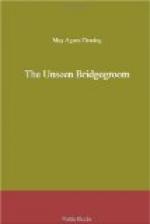“What do you mean to do, Mollie? But I suppose you have no plan formed yet.”
He spoke in a matter-of-fact tone, looking at her askance, and Mollie sighed wearily.
“Yes, I have a plan. I intend to leave New York as soon as possible after to-morrow.”
“Indeed. May I ask—to go where?”
“Mr. Ingelow, I shall join my old company again. They will be glad to have me, I know. I have always kept up a correspondence with a friend I had in the troupe, and she continually, half in jest, wholly in earnest, urges my return. They are down in Kentucky now. I will write to the manager. He will forward me the funds to join them, I know. While I wait for his answer and remittance, good Mrs. Slimmens will provide me a home.”
She ceased, and rising up, walked over to the window.
Now was Mr. Ingelow’s time, surely, if he cared for Mollie at all; but Mr. Ingelow spoke never a word. He sat in dead silence, looking at the little figure by the window, knowing she was crying quietly, and making no attempt to wipe away those tears by one tender word.
The afternoon wore away. As the twilight fell, Mr. Ingelow took his departure, and Mollie went down to Mrs. Slimmens’ for a reviving cup of tea.
“I have everything arranged for the funeral, Mollie,” Mr. Ingelow said at parting. “I will be here by nine o’clock to-morrow. Don’t give yourself the least anxiety about the matter, Mollie.”
The young man departed. Mollie had her toast, and returned to the death-room. She remained there until past midnight with Mrs. Harmen; then, at Mrs. Slimmens’ earnest request, she retired, and that good woman took her place. At ten next day, the humble funeral cortège started. Mr. Ingelow sat in the carriage with Mollie, but they spoke very little during the melancholy drive.
It was a dismal day, with ceaseless rain, and sighing wind, and leaden sky. Mollie cowered in a corner of the carriage, her pale face gleaming like a star above her black wraps, the bright blue eyes unutterably mournful.
And Hugh Ingelow watched her with an indescribable expression in his fathomless eyes, and made no effort to console her.
The sods rattled on the coffin-lid, the grave was filled up, and everybody was hurrying away out of the rain.
It was all over, like some dismal dream, and Mollie, shivering under her shawl, took one last backward look at the grave of her mother, and was hurried back to the carriage by Hugh Ingelow.
But she was so deathly white and cold, and she trembled with such nervous shivering, that the young man drew her to him in real alarm.
“You are going to be ill, Mollie,” he said. “You are ill.”
“Am I?” said Mollie, helplessly. “I don’t know. I hope not. I want to go away so much.”
“So much? To leave me, Mollie?”
Mollie lifted her heavy eyes, filled with unutterable reproach.




